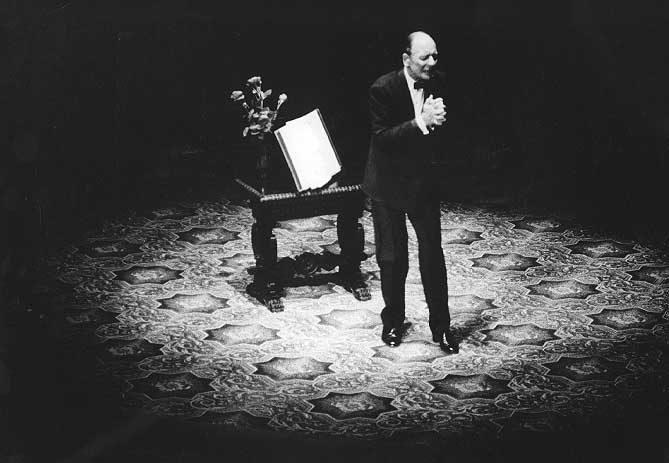In my “Sightings” column for today’s Wall Street Journal, I take note of a very important pair of high-culture home video releases, Leonard Bernstein: Omnibus and John Gielgud: Ages of Man. Here’s an excerpt.
* * *
In the fledgling years of network TV, Sunday mornings and afternoons were reserved for serious news shows like Edward R. Murrow’s “See It Now” and high-culture programs of various kinds, a practice so universally accepted that those time slots were collectively known to grumbling journalists as the “cultural ghetto.” Little did the grumblers know that a half-century later, the fine arts would have all but vanished from the commercial networks–and would be increasingly hard to find on PBS, the non-commercial network that was originally founded in part to give high culture a safe haven.
 I cut my artistic teeth watching TV on Sundays, and now that some of the long-lost programs of my youth have finally made their way to DVD, I find myself astonished by what ABC, CBS and NBC were willing to telecast all those years ago. For those who know PBS as the home of Lawrence Welk reruns and A&E as the network of “Dog the Bounty Hunter,” I recommend a pair of releases from E1 Home Video, “Leonard Bernstein: Omnibus” and “John Gielgud: Ages of Man.” Between them, they’ll open your eyes to the unlimited possibilities of TV as a force for cultural good–and fill you with despair at the fact that such high-minded programming has largely disappeared from the small screen.
I cut my artistic teeth watching TV on Sundays, and now that some of the long-lost programs of my youth have finally made their way to DVD, I find myself astonished by what ABC, CBS and NBC were willing to telecast all those years ago. For those who know PBS as the home of Lawrence Welk reruns and A&E as the network of “Dog the Bounty Hunter,” I recommend a pair of releases from E1 Home Video, “Leonard Bernstein: Omnibus” and “John Gielgud: Ages of Man.” Between them, they’ll open your eyes to the unlimited possibilities of TV as a force for cultural good–and fill you with despair at the fact that such high-minded programming has largely disappeared from the small screen.
“Omnibus” was a cultural TV magazine underwritten by the Ford Foundation that shuttled among the three networks in the ’50s. Hosted by Alistair Cooke, it offered viewers glimpses of everything from Orson Welles’ “King Lear” to Mike Nichols and Elaine May, but it is best remembered by historians of American music for having introduced Leonard Bernstein to TV audiences. Unlike his later “Young People’s Concerts,” Bernstein’s seven “Omnibus” shows were made specifically for adult viewers, and they used the medium in a way that remains electrifyingly fresh to this day….
If anything, “Ages of Man” is more remarkable still, consisting as it does of a hundred-minute program in which the most admired classical actor of the 20th century, standing alone on a near-bare stage in a business suit, does nothing whatsoever but recite and talk about sonnets by and excerpts from the plays of William Shakespeare. Gielgud had performed this one-man show around the world between 1957 and 1966, when he brought its phenomenally successful run to a close by filming it for CBS. The black-and-white telecast, directed by Paul Bogart, is as devoid of high-tech gimmickry as a slab of rare roast beef: Virtually all of the show is shot in close-up, and Gielgud’s comments are as unobtrusive as the dirt-plain set. Yet it is precisely because of this simplicity that “Ages of Man” is so priceless…
* * *
Read the whole thing here.
An excerpt from “Beethoven’s Fifth Symphony,” Leonard Bernstein’s first Omnibus telecast:
Terry Teachout on the arts in New York City
